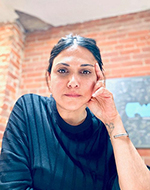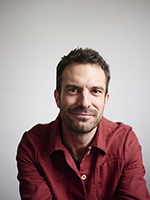|
|
Early Bird discount—$15 off!

Have a story to tell? Creative nonfiction is a genre that embraces, but is not limited to, the personal essay, memoir, narrative nonfiction, social commentary, travel writing, historical accounts, and biography, all enhanced by such elements as description, dramatic scenes, dialogue, and characterization. Enter by June 30 to get the Early Bird discount of $15 off your initial entry fee.
This year's judge is Daniel Allen Cox.
Early Bird discount entry fee until June 30, 2023 (includes a 1-yr print sub):
$20 CAD for each entry from Canada
$30 CAD for each entry from elsewhere
$15 CAD for each additional entry, no limit
Full contest guidelines on our website.
Mehr-Afarin Kohan, issue #222 fiction contributor
 Volunteer Joey Mauro talks with the spring issue #222 contributor about the impact of the Iranian Revolution, writing about the past as a way to find yourself, and how storytelling keeps a culture alive in her story "North of the Ruins." Volunteer Joey Mauro talks with the spring issue #222 contributor about the impact of the Iranian Revolution, writing about the past as a way to find yourself, and how storytelling keeps a culture alive in her story "North of the Ruins."
JM: What do memory, the passage of time, and the layering of the two help you to explore in the story? Does your background in psychoanalysis inform your exploration of memory?
MAK:
I find what remains of the passage of time, and of our childhoods, are memories. Memories tarnished by time, by the new revisions and interpretations that our minds create of those memories. As every time a memory is remembered, it is also changed in the process. Psychoanalysis is also concerned with remembering the past—a process of uncovering and discovery. But it is less like an archeological excavation and more like feeling one’s way through a dark corridor, trying to make out the shapes by touching around them.
When we are disconnected from our place of origin, reconstruction of the past becomes even more contentious as we have less linkages available to us in the present time. Having left Tehran, Iran as a teenager about 25 years ago, I have recently been preoccupied (probably a function of turning forty!) with what remembering of a lost past looks like. “North of the Ruins” is one story in a series where I take myself to those hidden corridors of my mind, trying to reach sights, voices, smells of a childhood that feels so distant to me due to separations and alienations.
Read the rest of Mehr-Afarin Kohan's interview.
Kayla Czaga, issue #222 poetry contributor
 Volunteer Sam Bollinger talks with the spring issue #222 contributor about themes that surface subconsciously, advice to share with your past self, and the necessity of humour when writing about dark topics in her poems "Safe Despair," "Static," and "Self-Portrait with Pizza Pop." Volunteer Sam Bollinger talks with the spring issue #222 contributor about themes that surface subconsciously, advice to share with your past self, and the necessity of humour when writing about dark topics in her poems "Safe Despair," "Static," and "Self-Portrait with Pizza Pop."
SB: Time is not linear in “Self Portrait with Pizza Pop,” and the speaker’s past, present, and future selves exist in the poem simultaneously. If you could, what advice would you share with the Kayla who was just beginning to write and send out work?
KC:
I recently found a journal I’d kept from around this time—2012/2013. In a lot of entries, I was really mad at how little I was writing. I never felt like I was writing enough, but at the time, I was actively (and quite quickly) writing my first collection. The funny thing is that I still journal about how little I’m writing, how it never feels like enough. I’d like to tell both of these Kaylas that they are probably writing enough. I’d like if they believed me, but it’s unlikely they will. I’d also like to encourage 2012 Kayla to take the time to develop organizational systems that work for her and to let her know that writing comes with more administrative work than she’d like it to—really, a lot of paperwork. Also that she should trust how she feels about things more often.
Read the rest of Kayla Czaga's interview.
Paul Ruban, issue #222 fiction contributor (translated by Neil Smith)
 Volunteer Kaye Miller talks with the spring issue #222 contributor about his upcoming novel, what a story can gain through translation, and writing from the perspective of a 60s “astrowife.” We published an English translation of Paul Ruban's story, "Stargazer," which was translated from the French by Neil Smith. Volunteer Kaye Miller talks with the spring issue #222 contributor about his upcoming novel, what a story can gain through translation, and writing from the perspective of a 60s “astrowife.” We published an English translation of Paul Ruban's story, "Stargazer," which was translated from the French by Neil Smith.
KM: This story is refreshingly funny, not just in Louise’s witty narration, but also through the charming absurdity of Mitch’s wide-eyed love for space. As both a writer and translator, do you ever worry about how humour translates? What kind of extra challenges do you think it can pose?
PR:
I believe that humour is cultural, so I do worry about how it translates. Wordplays are notoriously tricky. Interestingly however, because this is a French story set in an English-speaking context (1960s-70s America), a part of me feels that the humour shines even brighter in its English version, especially in the nuances of suburban banter so wonderfully rendered by translator Neil Smith. It's a telling example of how the alchemy of translation sometimes operates. In her book on literary translation, Un bien nécessaire, Lori Saint-Martin argues that there are instances where an original text is enriched by its translation. I definitely feel this was the case here. Something was gained, and made to feel more authentic.
Read the rest of Paul Ruban's interview.
|
|
|
|
|
|
|
|
|
|
|
|